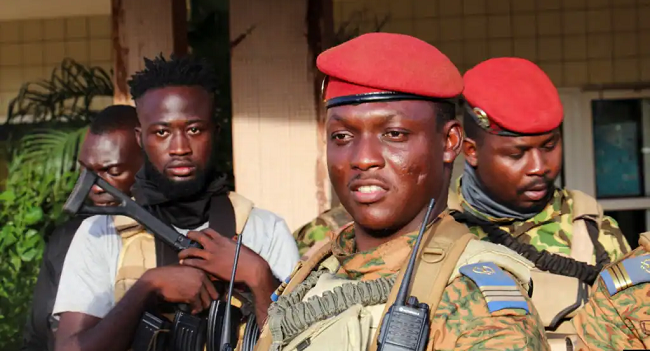Despite never having left Nigeria, Lagos-based auto repairman Kehinde Sanni holds a deep admiration for Captain Ibrahim Traore, the military leader of Burkina Faso who seized power in a 2022 coup.
“Nigeria needs someone like Ibrahim Traore. He’s doing well for his country,” Sanni said.
His praise reflects a growing trend among Nigerians influenced by viral videos, memes, and social media posts — many of which are misleading or outright false — that paint Traore as a fearless, anti-Western reformer reclaiming Burkina Faso’s sovereignty.
Traore rose to power amid rising anti-French sentiment in the Sahel and now enjoys support from other former French colonies like Mali and Niger. The three nations recently formalized their alliance by launching the Alliance of Sahel States and holding their first ministerial meeting in Moscow — underscoring their pivot from Paris to Moscow.


Online, Traore is lionized as a symbol of defiance against the West. But experts warn that this glorification, especially in Nigeria, could pose significant threats to democratic governance.
“This rising admiration for Traore in Nigeria normalizes military coups as legitimate political solutions and exposes the country to foreign ideological influence,” said Malik Samuel, a senior researcher at the pan-African think tank Good Governance Africa.
Prominent Nigerian voices have also joined the praise. Actress and politician Hilda Dokubo recently wrote on X (formerly Twitter), “Ibrahim Traore is proof that a country reflects the quality of its leadership.”
The surge in Traore’s popularity comes as Nigerians endure the worst cost-of-living crisis in decades, triggered by President Bola Ahmed Tinubu’s sweeping economic reforms. For many struggling citizens, exaggerated claims of Traore transforming Burkina Faso into a booming economy strike a hopeful chord.
“Traore checks all the boxes — young, bold, anti-Western, and cooperative with Russia, especially through Wagner-linked groups now known as the Africa Corps,” said Ikemesit Effiong, a partner at Lagos-based consultancy SBM Intelligence.
Yet many of the claims fueling this narrative have been debunked. One viral Facebook post featured a high-rise residential complex allegedly built under Traore’s administration. Fact-checkers at AFP revealed the building is actually located in Tizi Ouzou, Algeria.


In another case, a video of Traore attending the inauguration of a cement factory in Burkina Faso circulated alongside false claims that he had slashed cement prices — a claim with no basis in fact.
These disinformation efforts are not isolated incidents. Analysts and journalists say they are part of a wider, coordinated campaign, often backed by Russian propaganda networks, designed to bolster the image of military leaders in the Sahel.
“Russian propaganda units create the content, and local influencers are paid by intermediaries to distribute it online,” explained Nigerian journalist Philip Obaji, who studies disinformation and foreign influence in Africa.
Effiong sees this as part of a broader “Russian strategy” aimed at using social media to reshape public perception, promote military regimes, and present Moscow as a more respectful and supportive partner compared to traditional Western allies.
Since Niger’s July 2023 coup, Russian flags have become common at pro-junta rallies. In August 2024, Nigerian authorities arrested over 90 protesters in the north for waving Russian flags during demonstrations against rising hardship.
Despite the polished image portrayed online, Burkina Faso remains one of the most unstable and dangerous countries in the world. The ongoing jihadist insurgency — which has spilled over from Mali and Niger — has claimed tens of thousands of lives since 2015.
According to the Global Terrorism Index 2025, Burkina Faso ranks as the most terrorism-affected country in the world for the second year in a row.

Journalists and dissenters have increasingly become targets of repression. Reporters have been detained, silenced, or disappeared under the guise of fighting terrorism. One vocal critic, exiled financial analyst Maixent Some, accused Traore of mismanaging the country. In response, the junta declared him wanted in April.
While many Nigerians are captivated by Traore’s mythologized image, experts urge caution: beneath the social media glamour lies a troubled regime marked by violence, suppression, and strategic disinformation.




